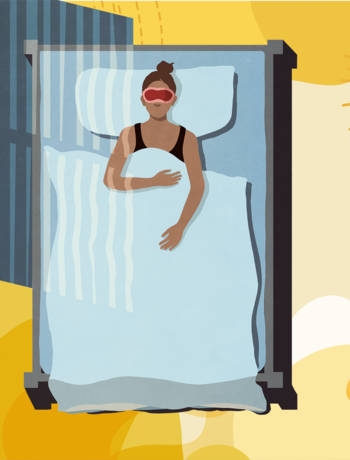Health
10 tips for a great night’s sleep in 2022
by Sarah Maber

A proper night’s rest is essential to good health, but many of us struggle to drop off at night, or wake frequently and can’t get back to sleep. Grab a pillow, curl up and read on for our expert-led plan to becoming a successful sleeper in 2022
1. Keep a sleep diary
Note down the time of your last food or drink; your last cup of coffee or tea; the number of alcoholic drinks you’ve had; the time you go to bed; if you found it hard to fall asleep; and if you woke up in the night, how often and how long for. Finally, note your waking-up time and an estimate of how long you were actually asleep. ‘Whether it is your behaviour, the environment, or your diet, completing a personal sleep diary is the most effective way of capturing all of these contributing factors,’ says Rob Hobson, author of The Art of Sleeping (HQ, £9.99). ‘Once you have understood what it is that is getting in the way of a good night’s sleep, you can use that to develop new habits.’
2. Sort out your bedroom
‘Your bedroom should be a place where you sleep and have sex, nothing more!’ says Dr Michael Mosley in his book Fast Asleep (Short Books, £9.99). He suggests removing TVs, replacing bright lights with softer bulbs, investing in a new mattress if your current one is more than seven to 10 years old – or using a mattress topper instead. Rob emphasises the importance of decluttering and making your room a sleep sanctuary: ‘Mess causes stress, so it’s important to declutter. I am naturally quite a messy person, but my bedroom has to offer the perfect sleep oasis.’
3. Seek out the light
‘Getting some morning sunlight is very valuable,’ says Guy Meadows, co-founder of the Sleep School (sleepschool.org) and author of The Sleep Book (Orion, £8.99). ‘If you’re working from home, a 10-minute ‘fake commute’ around the block in the morning will synchronise your body clock.’
4. Address the basics
‘Keep caffeine to a minimum,’ advises Guy. ‘Stop it from midday, and then after 6pm no decaf either. Alcohol breaks our sleep – if you want to have a good sleep, keep it out of your system, and at least four nights out of seven, try to avoid it completely. If you are having a drink, make sure you leave enough time between drinking and sleep; at least a couple of hours.’ He also recommends allowing a minimum of two, but ideally four, hours between eating and sleeping.
5. Go to bed at the same time every night
‘Keeping a regular sleep-wake cycle helps to set your internal body clock to the right time, strengthening the connection between good quality sleep and the night-time,’ says Guy.
6. Implement an electronic sundown
Dr Nerina Ramlakhan, a physiologist, sleep expert and author of The Little Book of Sleep (Gaia, £7.99) stresses how important it is to pull back from technology in the hour before you go to bed. ‘Read books but not e-books. Keep your clock turned away from you at night and don’t use your phone as an alarm clock,’ she says. ‘Instead, get an old-fashioned clock and try to stop looking at the time during the night. Remember, it’s normal to wake sometimes in the night – you’re only keeping yourself awake by fretting about it.’
7. Practise mindfulness
‘When you first get into bed, it can be helpful to take a few minutes to notice your sense of touch,’ says Guy. ‘Acknowledge the feel of your pillow on your face, the duvet on your toe or where your mattress connects with your body. Consider whether the textures are hard, soft, smooth, rough, hot or cold… use this as a helpful way to let go of your struggles and get you in the right place for sleep.’
8. Falling — and staying — asleep strategies
‘What we see time and time again is that people say they’re feeling sleepy, but as soon as they put their heads on the pillow, their minds start racing,’ says Guy. He suggests using mindfulness techniques – noticing that your mind is racing, for instance, without getting caught up in the details.
9. Label your thoughts
If you can’t slow your mind, Guy says to try naming your thoughts. ‘For example, say to yourself, “I can see that my mind is showing me work thoughts, or children thoughts.” Labelling them allows us to stand back and get perspective.’ This strategy also works for controlling the anxiety that sometimes comes with middle-of-the-night waking. ‘You might want to label them “the crazy thoughts”… and say to yourself: “oh, and I see you brought your friends anxiety and stress along, too!”’
10. Stay calm
If you wake in the middle of the night, Guy suggests adopting a state of ‘quiet wakefulness’. ‘Be in bed and rest,’ he advises. ‘You get a lot of benefit from just resting in your sleep space.’ Finally, don’t panic. ‘We’ve helped people who don’t sleep for more than two or three hours a night – sleep is a trainable skill,’ says Guy. He points to the programmes offered on the free-to-download Sleep School app. ‘Even if you are the most chronic insomniac, you can teach yourself to sleep well. It’s about gently retraining the brain.’












